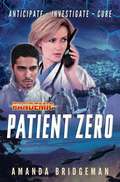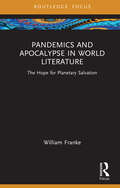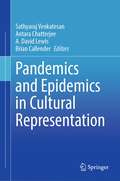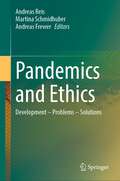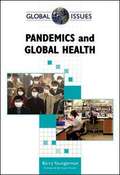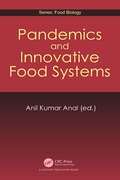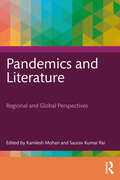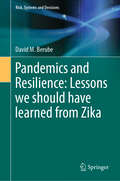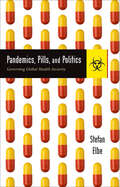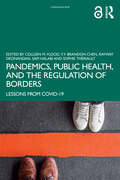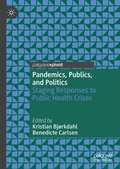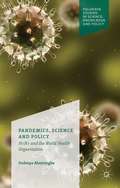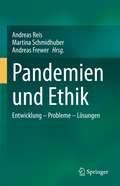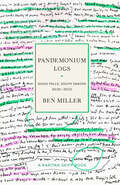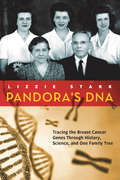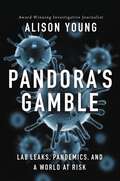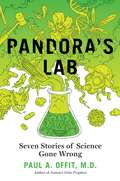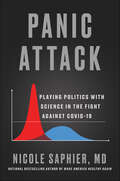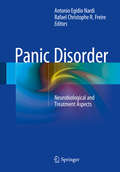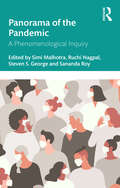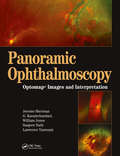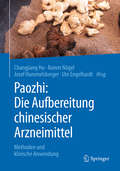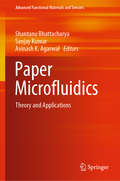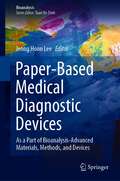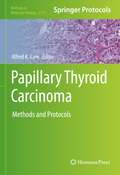- Table View
- List View
Pandemic: A Pandemic Novel (Pandemic #1)
by Amanda BridgemanBased on the smash hit boardgame, here&’s the debut of an incredible new novel series that shows just what humanity can achieve when experts work together, to ensure a global pandemic is never allowed to break out againBodhi Patel is the brand new Lead Epidemiologist for the world&’s top epidemic specialists, Global Health Agency, but there&’s no time to settle in: his new boss, Helen Taylor, deploys GHA to contain a mysterious new killer virus spreading from Peru into Brazil. On the ground they learn that the virus is loose in a region controlled by a heavily armed drug warlord, and the race against time to discover a cure just got a whole lot tougher. Meanwhile, Bodhi finds himself with a newly reshuffled team still smarting from the changes, including his ex – the last person he expected to be working with.
Pandemics and Apocalypse in World Literature: The Hope for Planetary Salvation (Routledge Focus on Literature)
by William FrankePandemics and Apocalypse rereads classical narratives of plague from the Bible (Exodus) and classical antiquity, both Greek (Homer, Thucydides, Sophocles) and Roman (Lucretius, Virgil, Ovid), through the Middle Ages (Dante, Boccaccio) and Modernity (Defoe, Manzoni, Artaud, Camus) as a basis for contemplating the significance of the recent Covid-19 pandemic. It concerns how we are to confront future pandemics and other inextricably related crises, notably those of an ecological nature. Responses to Covid-19 typically set everything on defeating this “enemy,” but actually we cannot eliminate viruses without eliminating ourselves. We need to see the pandemic as revealing us to ourselves in our inherently vulnerable condition as a first step to admitting the infinite openness to one another and to our Ground—physical and metaphysical—that alone can save our world by engendering a different attitude, open and engaged, to one another and to the Earth as sources of our collective life.
Pandemics and Epidemics in Cultural Representation
by A. David Lewis Sathyaraj Venkatesan Antara Chatterjee Brian CallenderThis edited book analyses how artists, authors, and cultural practitioners have responded to and represented episodes of epidemics/pandemics through history. Covering a broad range of notable epidemics/pandemics (black death, cholera, Influenza, AIDS, Ebola, COVID-19), the chapters examine the cultural representations of epidemics and pandemics in different contexts, periods, languages, media, and genres. Interdisciplinary in nature and drawing on perspectives from medicine, literature, medical anthropology, philosophy of medicine, and cultural theory, the book investigates and emphasizes the urgent need to reflect on past catastrophes caused by such outbreaks. By delving into cultural history, it re-examines how societies and communities have responded in the past to species-threatening epidemics/pandemics. Sure to be of interest to lay readers as well as students and researchers, this work situates epidemics and pandemics outbreaks within the contexts of culture and narrative, and their complex and layered representation, commenting on intersections of contagion, culture, and community. It offers a cross-cultural, global, and comparative analysis of the trajectories, histories and responses to various epidemics/pandemics that impacted people worldwide.
Pandemics and Ethics: Development – Problems – Solutions
by Andreas Reis Andreas Frewer Martina SchmidhuberPandemics such as Covid-19, Ebola, SARS, and influenza, as well as the necessary measures for their research, prevention, and treatment, raise a number of ethical issues that confront science, the medical profession, and health policy.This overview volume, written by renowned experts from medicine, the humanities, and the social sciences, addresses the central ethical issues in pandemics. Focusing on the disciplines of philosophy, public health, bioethics, and law, the book discusses issues of resource allocation, triage, and research, as well as restrictions on freedom, rights and duties of health professionals, and ethical aspects of digital medicine in crises. The volume is intended to serve as a handbook and to provide physicians as well as nurses, politicians and interested laypersons with valuable advice on how to deal with the difficult moral problems of epidemics and pandemics.With expert contributions by Steffen Augsberg (Giessen), Klaus Bergdolt (Cologne), Nikola Biller-Andorno (Zurich), Walter Bruchhausen (Bonn), Christiane Druml (Vienna), Hans-Jörg Ehni (Tuebingen), Alice Faust (Berlin), Sophia Forster (Erlangen-Nuremberg), Andreas Frewer (Erlangen-Nuremberg), Sara Gerke (Boston/Cambridge), Patrik Hummel (Eindhoven), Elena Jirovsky-Platter (Vienna), Katharina Kieslich (Vienna), Otmar Kloiber (Ferney-Voltaire), Ulrich H. J. Körtner (Vienna), Eva Kuhn (Bonn), Georg Marckmann (Munich), Timo Minssen (Copenhagen), Tim Nguyen (Geneva), Barbara Prainsack (Vienna), Andreas Reis (Geneva), Anita Rieder (Vienna), Stephan Rixen (Bayreuth), Lana Saksone (Berlin), Martina Schmidhuber (Graz), Harald Schmidt (Philadelphia), Annabel Seebohm (Brussels), Daniel Strech (Berlin), Sebastian Wäscher (Zurich), Hans-Werner Wahl (Heidelberg), Stefanie Weigold (Berlin), and Lena Woydack (Berlin).
Pandemics and Global Health
by Barry YoungermanInfectious agents have been prime movers of whole populations, economies, and societies, and our age is not exempt just because it arrives on a plane rather than a ship. Author Youngerman helps those who wish to inform themselves and others about pandemics, starting by looking at examples of mass infection in the US and elsewhere. He explains the primary sources available for study, gives advice on how to conduct research, provides some relevant facts and figures and describes key players. He closes with information on organizations and agencies that can supply information for research and an annotated bibliography. Annotation ©2008 Book News, Inc., Portland, OR (booknews.com)
Pandemics and Innovative Food Systems (Food Biology Series)
by Anil Kumar AnalThe debate on health, nutrition and food security could not have arisen at a more opportune time. The recent pandemic has given rise to increased food and nutrition insecurity for individuals, families, and communities. The crisis threatened the food security and nutrition of millions of people, many of whom were already suffering. We face possible disruptions to the functioning of food systems, with severe consequences for health and nutrition. Pandemics create a greater burden for poorer countries and countries since they are already pressure of inadequate food supplies. With concerted action, we can not only avoid some of the worst impacts but do so in a way that supports a transition to more sustainable food systems that are in better balance with nature and that support healthy diets – and thus better health prospects for all. This book aims to highlight the impact of pandemics in food systems and nutrition security. It draws on the experience from the past and present pandemics to better prepare the world for future crises.
Pandemics and Literature: Regional and Global Perspectives
by Kamlesh Mohan Saurav Kumar RaiThis volume provides a literary-cum-historiographical analysis of epidemics and pandemics. It looks at folklore, tribal folktales, eyewitness accounts, memoirs and missionary writings from India and the west to explore the history of some of the major outbreaks in history. The chapters focus on the impact of outbreaks such as plague, cholera, malaria, tuberculosis and COVID-19, upon the material life of people, their social dislocation and their complex responses to such crises.The book studies the role of pandemics in pushing scientists, social actors and littérateurs to develop new paradigms in knowledge generation, theories of environmental dislocation and the economic slide. It examines themes such as changes in the perception of epidemic diseases across different periods of history, popular responses to state intervention during epidemics, gendering epidemics, as well as the impact of rumours during epidemics.An important contribution to the social history of health and medicine, the volume will be useful for students and researchers of cultural studies and medical anthropology, public health, literature, history of pandemics and epidemics, sociology of medicine and South Asian studies.
Pandemics and Resilience: Lessons we should have learned from Zika (Risk, Systems and Decisions)
by David M. BerubeThe aim of the book was to produce the most comprehensive examination of a pandemic that has ever been attempted. By cataloging the full extent of the Zika pandemic, this book will be the most complete history and epistemic contextualization ever attempted to date. The work should function as the primary source for students, researchers, and scholars who need information about the Zika pandemic. This book examines the technical literature, digital and popular literature, and online materials to fully contextualize this event and provide a bona fide record of this event and its implications for the future. It is somewhat serendipitous that while this work was underway, we are going through another pandemic. One of the primary lessons we did not learn by Zika was pandemic events will return repeatedly, and we need to learn from each one of them to prepare the planet for the next one. Just because Zika seemed to have died out does not make it less important. We were lucky that the virus evolved into what seemed to be a less virulent version of itself, and the vector mosquitoes were concentrated elsewhere. Finally, this book represents a tour de force in scholarship involving nearly 4,000 sources of information and does not shy from a detailed examination of the controversies, conspiracies, and long-term consequences when we avoid learning from outbreaks, such as Zika.
Pandemics, Pills, and Politics: Governing Global Health Security
by Stefan ElbeThe fascinating story of Tamiflu's development and stockpiling against global health threats.orld's most prominent medical countermeasure, Tamiflu.A pill can strengthen national security? The suggestion may seem odd, but many states around the world believe precisely that. Confronted with pandemics, bioterrorism, and emerging infectious diseases, governments are transforming their security policies to include the proactive development, acquisition, stockpiling, and mass distribution of new pharmaceutical defenses. What happens—politically, economically, and socially—when governments try to protect their populations with pharmaceuticals? How do competing interests among states, pharmaceutical companies, regulators, and scientists play out in the quest to develop new medical countermeasures? And do citizens around the world ultimately stand to gain or lose from this pharmaceuticalization of security policy?Stefan Elbe explores these complex questions in Pandemics, Pills, and Politics, the first in-depth study of the world’s most prominent medical countermeasure, Tamiflu. Taken by millions of people around the planet in the fight against pandemic flu, Tamiflu has provoked suspicions about undue commercial influence in government decision-making about stockpiles. It even found itself at the center of a prolonged political battle over who should have access to the data about the safety and effectiveness of medicines.Pandemics, Pills, and Politics shows that the story of Tamiflu harbors deeper lessons about the vexing political, economic, legal, social, and regulatory tensions that emerge as twenty-first-century security policy takes a pharmaceutical turn. At the heart of this issue, Elbe argues, lies something deeper: the rise of a new molecular vision of life that is reshaping the world we live in.
Pandemics, Public Health, and the Regulation of Borders: Lessons from COVID-19
by Colleen M. Flood Sam Halabi Sophie Thériault Raywat Deonandan Y.Y. Brandon ChenThis book examines how the COVID-19 pandemic has engendered a new and challenging environment in which borders drawn around people, places, and social structures have hardened and new ones have emerged.Over the course of the COVID-19 pandemic, borders closed or became unwelcoming at the international, national, sub-national, and local levels. Debate persists as to whether those countries and territories that tightly managed their borders, like New Zealand, Australia, or Hong Kong, got it ‘right’ compared to those that did not. Without doubt, a majority of those who suffered and died throughout the pandemic have been those from vulnerable populations. Yet on the other hand, efforts taken to manage the spread of the disease, such as through border management, have also disproportionately affected those who are most vulnerable. How then is the right balance to be struck, acknowledging, too, the economic and other imperatives that may dissuade governments from taking public health steps? This book considers how international organizations, countries, and institutions within those countries should conceive of, and manage, borders as the world continues to struggle with COVID-19 and prepares for the next pandemic. Engaging a range of international, and sub-national, examples, the book thematizes the main issues at stake in the control and management of borders in the interests of public health.This book will be of considerable interest to academics in the fields of health law, anthropology, economics, history, medicine, public health, and political science, as well as policymakers and public health planners at national and sub-national levels.
Pandemics, Publics, and Politics: Staging Responses To Public Health Crises
by Kristian Bjørkdahl Benedicte CarlsenPandemics are potentially very destructive phenomena, and for that reason, they both fascinate and frighten us. And because they are shot through with uncertainty, they often become sites of contestation and conflict. This book presents research on the 2009 pandemic and other public health crises in an attempt to describe and analyze the distinctive challenges that such diseases pose today. Thanks to vaccines, more reliable provision of medical services, more effective means of communication, and a more educated public, some argue we will not see a new Black Plague – or even Spanish Flu – in our time. Today we face new challenges, however, which can both enable diseases to reach pandemic scales and affect our ability to enact an appropriate response. Those include fragmentation of media, tribalization of “knowledge regimes,” the increasingly troubled status of scientific and political expertise, growing cross-continental mobility, as well as the globalization and commercialization of pandemic response systems. These distinctive complexities make the need to stage public action in response to pandemics and other public health crises a crucial problem, on which thousands of human lives hinge. This volume consists of a handful of social science and humanities studies of precisely such complexities, and thus offers a much-needed supplement to existing research on pandemics and pandemic response.
Pandemics, Science and Policy
by Sudeepa AbeysinghePandemics, Science and Policy examines the case study of the World Health Organisation's (WHO) representation and management of the 2009 H1N1 Pandemic. It analyses key criticisms made about the WHO's actions through an examination of the social context in which pandemic management decisions were made, and ultimately illustrations the various ways in which the WHO's account was vulnerable to contestation. Abeysinghe provides a persuasive account of the interplay between uncertain science and the creation of global policy. The book demonstrates that the fragility of the WHO's account and decisions largely lay in both the (lack of) scientific evidence the WHO received, and its use and representation of this evidence. Importantly, it shows how uncertain risks can affect policy and action on the global level.
Pandemien und Ethik: Entwicklung – Probleme – Lösungen
by Andreas Reis Andreas Frewer Martina SchmidhuberPandemien wie Covid-19, Ebola, SARS und Influenza sowie die notwendigen Maßnahmen zu ihrer Erforschung, Prävention und Behandlung werfen eine Reihe von ethischen Fragestellungen auf, mit denen Wissenschaft, Ärzteschaft und Gesundheitspolitik konfrontiert werden.Dieser Übersichtsband, verfasst von namhaften Expert*innen aus Medizin, Geistes- und Sozialwissenschaften, behandelt die zentralen ethischen Themenkomplexe in Pandemien. Mit Schwerpunkt der Disziplinen Philosophie, Public Health, Bioethik und Recht werden Fragen der Ressourcen-Verteilung, Triage und Forschung ebenso diskutiert wie Einschränkungen der Freiheit, Rechte und Pflichten von Gesundheitsberufen oder ethische Aspekte digitaler Medizin in der Krise. Das Buch soll als Handreichung dienen und Ärzteschaft wie auch Pflege, Politik und interessierten Laien wertvolle Hinweise liefern für den Umgang mit den schwierigen moralischen Problemen bei Epidemien und Pandemien.Mit Fachbeiträgen von Steffen Augsberg (Gießen), Klaus Bergdolt (Köln), Nikola Biller-Andorno (Zürich), Walter Bruchhausen (Bonn), Christiane Druml (Wien), Hans-Jörg Ehni (Tübingen), Alice Faust (Berlin), Sophia Forster (Erlangen-Nürnberg), Andreas Frewer (Erlangen-Nürnberg), Sara Gerke (Boston/Cambridge), Patrik Hummel (Erlangen-Nürnberg), Elena Jirovsky-Platter (Wien), Katharina Kieslich (Wien), Otmar Kloiber (Ferney-Voltaire), Ulrich H. J. Körtner (Wien), Eva Kuhn (Bonn/München), Georg Marckmann (München), Timo Minssen (Kopenhagen), Tim Nguyen (Genf), Barbara Prainsack (Wien), Andreas Reis (Genf), Anita Rieder (Wien), Stephan Rixen (Bayreuth), Lana Saksone (Berlin), Martina Schmidhuber (Graz), Harald Schmidt (Philadelphia), Annabel Seebohm (Brüssel), Daniel Strech (Berlin), Sebastian Wäscher (Zürich), Hans-Werner Wahl (Heidelberg), Stefanie Weigold (Berlin) und Lena Woydack (Berlin).
Pandemonium Logs: Sioux Falls, South Dakota, 2020–2022 (Raritan Skiff Books)
by Ben MillerIn 2015, Ben Miller and the poet Anne Pierson Wiese moved from New York City to Sioux Falls, South Dakota, to explore their midwestern roots and to focus on their writing careers. Working a day job in a hospital, Miller had a front-row seat to the COVID-19 pandemic as it moved from the coasts to the urban Midwest. Pandemonium Logs casts an unflinching eye on the state of the worker in the US health-care system during a global pandemic, giving voice to the doctors, nurses, support staff, patients, and families caught in the complex swirl of daily dilemmas and crucial choices. In unsparing yet sympathetic prose, Ben Miller creates an intimate portrait of the impact of COVID on the diverse people of South Dakota. Through a wide range of characters—from understandably confused patients to quietly competent nurses—he explores the human complexities of the crisis: a doctor based in Mumbai who treats critically ill patients in the Dakotas via a tenuous hodgepodge of telehealth apparatus, a Hydra of six workplace trainers who together cannot train one employee to do one job, a vice president of corporate hospitality who lives to rip down safety signs as fast as nurses post them, a ninety-year-old hospital volunteer who pushes wheelchairs containing patients half his age. In Pandemonium Logs, Miller provides precise and moving observations of ordinary people doing extraordinary things.
Pandora's DNA: Tracing the Breast Cancer Genes Through History, Science, and One Family Tree
by Lizzie StarkWould you cut out your healthy breasts and ovaries if you thought it might save your life? That's not a theoretical question for journalist Lizzie Stark's relatives, who grapple with the horrific legacy of cancer built into the family DNA. It is a BRCA mutation that has robbed most of her female relatives of breasts, ovaries, peace of mind, or life itself. In Pandora's DNA, Stark uses her family's experience to frame a larger story about the so-called breast cancer genes, exploring the morass of legal quandaries, scientific developments, medical breakthroughs, and ethical concerns that surround the BRCA mutations. She tells of the troubling history of prophylactic surgery and the storied origins of the boob job and relates the landmark lawsuit against Myriad Genetics, which held patents on the BRCA genes every human carries in their body until the Supreme Court overturned them in 2013. Although a genetic test for cancer risk may sound like the height of scientific development, the treatment remains crude and barbaric. Through her own experience, Stark shows what it's like to live in a brave new world where gazing into a crystal ball of genetics has many unintended consequences.
Pandora's Gamble: Lab Leaks, Pandemics, and a World at Risk
by Alison YoungNamed to Kirkus Reviews&’ Best Books of 2023 A &‘remarkable book.&’ – The New York TimesThis fearless, deeply reported book about laboratory accidents asks the haunting question some elite scientists don&’t want the public to entertain: Did the COVID-19 pandemic start with a lab leak in Wuhan, China? This is an obvious question. Yet there&’s been an extraordinary effort by government officials in China, as well as leading scientific experts in the United States and around the world, to shut down any investigation or discussion of the lab leak theory. In private, however, some of the world&’s elite scientists have seen a lab accident as a very real and horrifying possibility. They know what the public doesn&’t. Lab accidents happen with shocking frequency. Even at the world&’s best-run labs. That&’s among the revelations from Alison Young, the award-winning investigative reporter who has spent nearly 15 years uncovering shocking safety breaches at prestigious U.S. laboratories for USA Today and other respected news outlets. In Pandora&’s Gamble, Young goes deep into the troubling history -- and enormous risks -- of leaks and accidents at scientific labs. She takes readers on a riveting journey around the world to some of the worst lab mishaps in history, including the largely unknown stories of the lab workers at the U.S. Army&’s Camp Detrick who suffered devastating infections at alarming rates during World War II. And her groundbreaking reporting exposes for the first time disturbing new details about recent accidents at prestigious laboratories – and the alarming gaps in government oversight that put all of us at risk. Sourced through meticulous reporting and exclusive interviews with key players including Dr. Anthony Fauci, former CDC Director Tom Frieden and others, Young&’s examination reveals that the only thing rare about lab accidents is the public rarely finds out about them. Because when accidents happen, powerful people and institutions often work hard to keep the information secret.
Pandora's Lab: Seven Stories of Science Gone Wrong
by Paul A. OffitWhat happens when ideas presented as science lead us in the wrong direction? History is filled with brilliant ideas that gave rise to disaster, and this book explores the most fascinating—and significant—missteps: from opium's heyday as the pain reliever of choice to recognition of opioids as a major cause of death in the U.S.; from the rise of trans fats as the golden ingredient for tastier, cheaper food to the heart disease epidemic that followed; and from the cries to ban DDT for the sake of the environment to an epidemic-level rise in world malaria. These are today's sins of science—as deplorable as mistaken past ideas about advocating racial purity or using lobotomies as a cure for mental illness. These unwitting errors add up to seven lessons both cautionary and profound, narrated by renowned author and speaker Paul A. Offit. Offit uses these lessons to investigate how we can separate good science from bad, using some of today's most controversial creations—e-cigarettes, GMOs, drug treatments for ADHD—as case studies. For every "Aha!" moment that should have been an "Oh no," this book is an engrossing account of how science has been misused disastrously—and how we can learn to use its power for good.
Panic Attack: Playing Politics with Science in the Fight Against COVID-19
by Nicole Saphier“Follow the science” is what they said. “Follow our politics” is what they meant. In Panic Attack, nationally bestselling author and physician Nicole Saphier uncovers the hypocrisy and hysteria which has characterized so much of the American pandemic response. While journalists trumpeted the importance of following science to “flatten the curve,” they praised Governors Andrew Cuomo and Phil Murphy, who sanctioned ill-equipped nursing homes to take COVID-positive patients, leading to an enormous death spike for New York and New Jersey. Plus, the old guard medical establishment captured by Dr. Fauci proved to be far too rigid during a health care emergency. While some state legislators are still concealing accurate records of nursing home deaths, many others have made anti-science decisions regarding re-opening plans; all of which fuel distrust and civil unrest. Democrat mayors like Bill de Blasio openly admitted that their decisions to keep schools closed were fueled by a “social contract” with teachers (that is: teachers’ unions), despite hard science saying this would be harmful.When anti-science measures are continuously implemented, the long-term consequences of such actions will likely stay with us for years to come. The pandemic has resulted in a failure of government, much of which is unavoidable in a unique disaster scenario. However, the rampant politicization of science, from the origin of the virus to the simple concept of wearing facemasks, has hopelessly muddied the water, divided the country, and knee-jerk anti-Trumpism made it all worse.
Panic Disorder
by Antonio Egidio Nardi Rafael Christophe R FreireThe book focuses on the neurobiological and treatment aspects of panic disorder. It describes the most recent research data and pharmacological therapeutic aspects of panic disorder. The biochemical, respiratory, imaging, and translational aspects will be together with diagnostic and pharmacological discussion. We have the collaboration of important and recognized researchers from various countries - Brazil, USA, Italy, Spain, United Kingdom, and Switzerland - all of them with a continuous and relevant work on anxiety disorders. "Panic Disorder: Neurobiological and Treatment Aspects" is intended to be a reference book for those who research or treat panic disorder and anxiety disorder patients.
Panorama of the Pandemic: A Phenomenological Inquiry (Academics, Politics and Society in the Post-Covid World)
by Simi Malhotra Ruchi Nagpal Steven S. George Sananda RoyThis volume provides a multi-nuanced analysis of the impact of the Covid-19 pandemic on various aspects of human existence, encompassing societal, economic, and inter-relational dimensions. It highlights a broad range of artistic and literary experiences that unfolded as a consequence of the pandemic or speak to that time.The book revisits pandemic-induced shifts, phenomenologically, including the digitization of art and representations of creativity, “performance” anxiety, socio-political climate determined by “racial algorithms,” gaming surges, employment insecurities, mental health issues from a pedagogical materiality, and the nature of apocalypse through literary reimaginations. It also delves into the global food crisis, reframing of family structures, and local subjectivities as lived experiences.A unique contribution, the book will be useful for students and researchers of cultural studies, digital humanities, mass media, sociology, mental health, psychology, medical anthropology, public health, literature, history of pandemics and epidemics, and South Asian studies.
Panoramic Ophthalmoscopy: Optomap Images and Interpretation
by William Jones Jerry Sherman Gulshan Karamchandani Sanjeev NathPanoramic Ophthalmoscopy: Optomap® Images and Interpretation comprehensively covers the state-of-the-art technology and the high-resolution digital images taken with the Panoramic200 Scanning Laser Ophthalmoscope. The optomap® Retinal Exam images provide ophthalmologists and optometrists with an extended view and photo-documentation of almost the entire retina. Inside Panoramic Ophthalmoscopy, Jerome Sherman, Gulshan Karamchandani, William Jones, Sanjeev Nath, and Lawrence A. Yannuzzi document and expertly explain all there is to know about this remarkable new technology. Over 500 images highlight the text, many of which have never been seen before, and provide detailed visual references for numerous eye disorders. This colorful atlas is the ideal resource for interpreting these images and diagnosing serious eye conditions that may have otherwise gone undetected.Panoramic Ophthalmoscopy contains an introductory chapter that highlights and contrasts panoramic ophthalmoscopy and optomap® images to all the traditional methods of fundus viewing. Inside you will find over 100 exemplary case presentations covering common and uncommon topics such as normal fundus, retinal tears, Coat’s disease, and diabetic retinopathy. Also included are cases of retinal and choroidal diseases and how they were diagnosed and managed using this technology. In the last chapter, the authors peer into the next frontier of imaging by introducing Optos fluorescein angiography and its myriad potential contributions to patient care, research, and clinical teaching.Each case presentation includes: History and chief compliant Clinical findings optomap® images Differential diagnosis Disposition and follow-up Cases are arranged into 11 chapters covering: Optic Disc Macula Vascular Inflammatory Mass Lesions Retinal Degenerations Peripheral Lesions With expert descriptions and hundreds of never before seen images, the all encompassing Panoramic Ophthalmoscopy: Optomap® Images and Interpretation is the perfect resource for optometrists, ophthalmologists, ophthalmic technicians, residents, and students who would like to learn more about and would like to benefit from this revolutionary technology.
Paozhi: Methoden Und Klinische Anwendung
by Changjiang Hu Rainer Nögel Josef Hummelsberger Ute EngelhardtDas Buch beschreibt - erstmalig im deutschsprachigen Raum - umfassend die fachgerechte Aufbereitung chinesischer Arzneimittel und geht auf die Möglichkeiten ein, wie z.B. die Wirkung des Mittels modifiziert und verstärkt werden kann oder unerwünschte Nebenwirkungen reduziert werden. Strukturiert, übersichtlich und systematisch dargestellt findet der Leser umfangreiche Beschreibungen des fertigen Produktes hinsichtlich Qualität, Aussehen und Geschmack sowie Angaben zur Verwendung der Arzneimittel und ihrer wichtigsten Zubereitungsformen in den gängigsten Rezepturen.Plus: Klinische Bewertungen, aktuelle Forschungsergebnisse und moderne analytische Untersuchungen. Zusätzlich sind definierte Prozessierungsmethoden aufgeführt und ermöglichen eine standardisierte Durchführung. Ein Nachschlagewerk und idealer Begleiter für alle Pharmazeuten, Mediziner und Studenten, die sich für die Traditionelle Chinesische Medizin interessieren und ihr Wissen vertiefen möchten.
Paper Microfluidics: Theory and Applications (Advanced Functional Materials and Sensors)
by Sanjay Kumar Shantanu Bhattacharya Avinash K. AgarwalThis volume provides an overview of the recent advances in the field of paper microfluidics, whose innumerable research domains have stimulated considerable efforts to the development of rapid, cost-effective and simplified point-of-care diagnostic systems. The book is divided into three parts viz. theoretical background of paper microfluidics, fabrication techniques for paper-based devices, and broad applications. Each chapter of the book is self-explanatory and focuses on a specific topic and its relation to paper microfluidics and starts with a brief description of the topic’s physical background, essential definitions, and a short story of the recent progress in the relevant field. The book also covers the future outlook, remaining challenges, and emerging opportunities. This book shall be a tremendous up-to-date resource for researchers working in the area globally.
Paper-Based Medical Diagnostic Devices: As a Part of Bioanalysis-Advanced Materials, Methods, and Devices (Bioanalysis #10)
by Jeong Hoon LeeThis book disseminates information on paper-based diagnostics devices and describes novel paper materials, fabrication techniques, and Basic Paper-based microfluidics/electronics theory. The section on sample preparation, paper-based electronics/sensors for developing paper-based point-of-care (POC) systems also contains detailed descriptions. In the application sections this book covers sensing technique for DNA/RNA, bacteria/virus and integration of lateral flow assay. The book provides deep understanding and knowledge of paper-based diagnostic device development in terms of concept, materials, fabrication and applications.
Papillary Thyroid Carcinoma: Methods and Protocols (Methods in Molecular Biology #2534)
by Alfred K. LamThis detailed volume presents status and management protocols with the objective of identifying proper guidelines and materials for research related to the most common malignant neoplasm in the thyroid gland, papillary thyroid carcinoma. After an introduction, the book explores diagnostic approaches and initial surgical managements for patients with papillary thyroid carcinoma, guidelines for macroscopic examination, microscopic examination, and pathological staging, molecular approaches to this cancer, pathology laboratory approaches, as well as radiology oncology treatment protocols. Written for the highly successful Methods in Molecular Biology series, chapters include introductions to their respective topics, lists of the necessary materials and reagents, step-by-step laboratory protocols that are readily reproducible, and tips on troubleshooting and avoiding known pitfalls. Authoritative and practical, Papillary Thyroid Carcinoma: Methods and Protocols serves as a vital resource for information on different aspects of the processes, cost, and resources available for the research and management of patients with papillary thyroid carcinoma.
